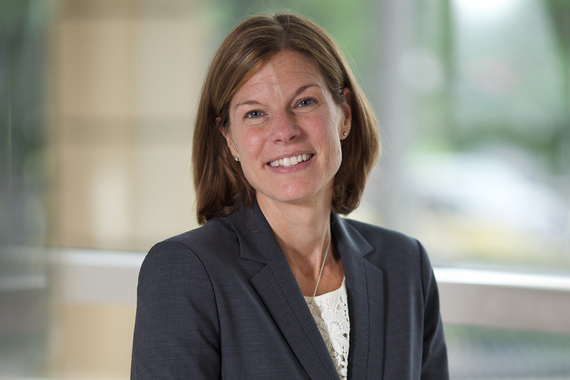Baby girls wear pink. Baby boys wear blue.
Little girls join dance. Little boys play hockey.
Young ladies study teaching. Young men study math.
Nice women marry nice men, raise nice little boys and girls, and the cycle of stereotypical life continues...unless you're like me.
I was born in the '70s and raised in the '80s and '90s. The stereotypes above were in full force, shaping my generation. But I was lucky. I was raised by parents who made a conscious effort to let me be who I was meant to be, free of stereotypes and full of surprises.
Growing up, I wore army fatigues a lot. I was one of three girls who played ice hockey in an all-boys league where one season I was awarded MVP. In college, I was a double major in math and computer science, and while I did have a minor in secondary education, I went on to be a business consultant, and later a digital marketer. I'm married to a wonderful woman, and we are raising our two beautiful girls in a way that will allow them to discover their true selves, in the same manner my parents allowed me.
But how has any of this experience made me stronger?
Having lived my life a bit "outside the box," I was often faced with unconscious bias. Whether it was my clothes, my short hair, the fact that I played hockey or something else, I was often mistaken for a boy and had to correct people, both young and old. When people realized I was a girl, they thought it was so "cute" that I played hockey or that it was so surprising that I studied math. And as I entered the workforce and was still single, I can't tell you how many times I was set up with someone's brother or best friend (in all fairness, I wasn't "out" to anyone at that point).
But those experiences never brought me down. Instead, they shaped who I have become as a wife, a mother, a daughter, a sister, a friend, and a leader. Because of it, I have developed a stronger understanding of the control I have over influencing the unconscious bias that all of us experience.
One recent example was on a train ride home from New York where, after a few long days of meetings, I wanted to find a seat by myself and decompress during the 5.5-hour journey home. As luck would have it, I instead found that seat next to the very social individual who flashed a smile and, upon a reciprocal smile back, the conversation floodgates opened. I will spare you all the details, but half-way through the ride he asked if I had kids, which was then followed by, "Is your husband home with them?"
Innocent right? Right. So as I always do in these situations, I explained that I'm married to a woman, a statement that usually warrants no additional discussion or explanation. But on this occasion it set a series of questions and comments into motion that would have tested the strongest of souls. I didn't walk away. I didn't get angry or combative. I simply recognized this was another opportunity to perhaps shift someone's thinking-to increase awareness. Was I successful? Maybe, maybe not. But I know I was more successful than I would have been if I pretended I was married to a man who was home taking care of the kids.
How we approach or respond to certain situations can change attitudes and preconceived notions that people hold, making them more aware and maybe making them more mindful. The essence of the term "unconscious bias" suggests we may not even be aware of the assumptions we've made or how those assumptions might impact those who cross our paths. Having the conversation can not only enlighten someone else's thinking but also may have the added benefit of furthering our own awareness.
Luckily, I don't encounter the extreme of the train ride scenario very often. I'm very fortunate to work in an organization that fosters diversity and not only encourages but also gives us the tools to be our authentic selves at work. I'm truly empowered to live and to lead by example. In doing so, I hope that I have created a work environment that is safe, healthy, and productive for everyone.

